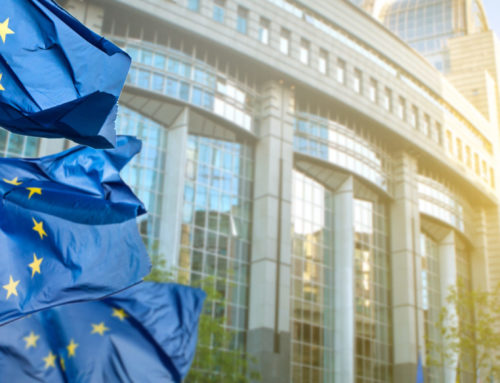The role of the EU Council Presidency is to push the European project both in the legislative field and in the field of social acceptability, without which the transformation of the European growth model will not become reality.
A road show of more than 400 events is planned from 1 January to 30 June 2022 throughout the country, including ministerial and expert meetings, parliamentary committees, symposiums and seminars.
Find out about the 5 projects that will structurally alter the balance of supply and demand of essential goods and services in the European market.
The French Presidency of the Council of the European Union (EU Council) opens an 18-month period during which the trio of France, the Czech Republic and Sweden will develop a joint programme for implementing the 2019-2024 strategy established by the Heads of State or Government of the 27 Member States. One of the main objectives of the joint programme is the ‘twin transition’, or dual climate and digital revolution.
A road show of more than 400 events is planned from 1 January to 30 June 2022 throughout the country, including ministerial and expert meetings, parliamentary committees, symposiums and seminars.
The role of the EU Council Presidency is to push the European project both in the legislative field and in the field of social acceptability, without which the transformation of the European growth model will not become reality.
In terms of the transition to carbon neutrality, we note that France is committed to advancing 5 projects that will structurally alter the balance of supply and demand of essential goods and services in the European market.
1. The creation of the carbon border adjustment mechanism (CBAM).
A priority dossier of the French Presidency, the text of its regulation is currently being examined by the Parliament before being debated within the EU Council. The creation of this environmental protectionism mechanism should facilitate the acceptance on European soil of other projects aimed in particular at extending the European "cap and trade" mechanism.
2. The revision of the EU Emissions Trading Scheme (ETS).
The modalities of the revision are still under consideration. The European Commission is proposing, in particular, to apply this cap-and-trade system to new sectors (maritime transport, construction and road transport), to lower the emissions cap, and to phase out free allowances in the aviation sector. Future decarbonisation requirements are thus to be expected and major efforts are to be made by France. In its European Semester 2020, the European Commission points out that French CO2 emissions from these sectors (transport and construction), together with agriculture, account for a greater share of national emissions (64%) than in the EU average (47%).
3. The introduction of eco-conditions and ‘mirror measures’ for the agricultural sector and the fight against imported deforestation.
For the first time, on 17 November 2021, the Commission presented its draft regulation on trade in soft commodities. The scheme aims to ban the import of products that have actively participated in deforestation in their countries of production. Sensitive commodities would be subject to authorisation depending on their precise geographical origin and the performance of satisfactory due diligence throughout the supply chain. France wants to speed up the negotiations.
In order to achieve the objectives defined by the European Climate Law, a collective effort by all economic actors is necessary.
4. The revision of the two directives on energy efficiency and renewable energy.
The Commission has proposed to increase the target for the share of renewable energy in gross final energy consumption from 32% to 40% by 2030. This proposal is currently being discussed in the EU Council. France supports this ambition with funding and will again make additional efforts. In 2020, the share of energy from renewable sources in French gross final energy consumption (19,1%) ranks 17th in the EU, below the national targets (23%), according to the Ministry of Ecological Transition.
5. The adoption of the regulation on electric batteries and their waste
The adoption of the regulation on electric batteries and their waste should be validated by the EU Council under the French Presidency. The standardisation of battery manufacturing and recycling will provide a framework for the development of a European industry. In France, three battery factory projects, led by Renault and Stellantis, are currently planned in the Hauts-de-France region. This industry is nevertheless dependent on critical inputs: lithium, cobalt and nickel in particular. In Alsace, a pilot project for lithium extraction, led by Eramet and supported by the EU, is currently underway.
Europe is shaping its common market and setting environmental conditions for its access.
Member States are required to meet their sustainable growth commitments. From now on, 30% of EU funds, including the Multiannual Financial Framework 2021-2027 and the Next Generation EU recovery instrument, are dedicated to natural resource management and the environment, amounting to €420 billion.
In order to achieve the objectives defined by the European Climate Law, a collective effort by all economic actors is necessary. At the end of the day, household budgets will be impacted, risking increased inequalities and social unrest. The French Presidency of the EU Council is also putting forward plans to create a Social Climate Fund to cushion such socio-economic consequences.
About Positivéco
At Positivéco, we see the new national and international regulations on CSR as an opportunity for positive growth.
Our aim: to apply financial and commercial skills to structure projects outside the traditional silos.
Since 2009, we have been supporting climate investment and development aid projects; we evaluate CSR policies and carry out extra-financial reporting for our clients. Positivéco advises financial institutions, public actors, listed and non-listed companies.
Request a callback today and discover how you can meet the new CSR requirements while serving the company’s project.

Who we are
With Positivéco, your success is our priority. Since our conception, we have always applied financial and commercial expertise outside the traditional silos, to structure successful and impactful client projects. This improves the visibility of your activities for enhanced profitability and increases your financial valuation.








Contact us now!